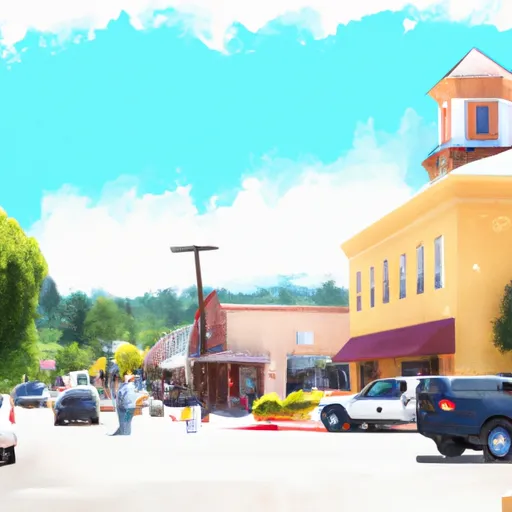-
 Snoflo Premium
Snoflo Premium
Get unlimited access to all our content
With no Ad interruptions! - Start Your Free Trial Login with existing account
Mc-Kinleyville
Eden Index
Climate
9.6
•
Recreation
4.4
•
Community
3.1
•
Safeguard
6.2/10

McKinleyville is a small town located on the northern California coast, in Humboldt County. It experiences a mild coastal Mediterranean climate with cool summers and wet winters. Summers are characterized by temperatures ranging from the mid-50s to mid-60s Fahrenheit, while winters see temperatures in the mid-40s to mid-50s Fahrenheit. The area receives abundant rainfall, with the wettest months being November through February.
Hydrology constituents in McKinleyville are influenced by its proximity to the Pacific Ocean. The Mad River flows through the town, providing a scenic water feature and recreational opportunities like fishing, kayaking, and boating. The coastal location also offers access to nearby beaches, where visitors can enjoy activities such as beachcombing, surfing, and exploring tide pools.
Outdoor recreation opportunities abound in McKinleyville. The town is surrounded by lush forests, making it ideal for hiking and mountain biking. The nearby Redwood National and State Parks offer stunning old-growth redwood forests, perfect for nature walks and camping. McKinleyville is also close to the Pacific Coast, providing opportunities for whale watching, beach picnics, and enjoying beautiful sunsets. With its diverse range of recreational activities and natural beauty, McKinleyville offers something for nature enthusiasts and outdoor lovers alike.
What is the Eden Index?
The Snoflo Eden Index serves as a comprehensive rating system for regions, evaluating their desirability through a holistic assessment of climate health, outdoor recreation opportunities, and natural disaster risk, acknowledging the profound impact of these factors on livability and well-being.
Climate Health Indicator (CHI): 9.6
Mc-Kinleyville receives approximately
1242mm of rain per year,
with humidity levels near 72%
and air temperatures averaging around
12°C.
Mc-Kinleyville has a plant hardyness factor of
9, meaning
plants and agriculture in this region tend to thrive here all year round.
By considering the ideal temperature range, reliable water supplies, clean air, and stable seasonal rain or snowpacks, the Climate Health Indicator (CHI) underscores the significance of a healthy climate as the foundation for quality living.
A healthy climate is paramount for ensuring a high quality of life and livability in a region, fostering both physical well-being and environmental harmony. This can be characterized by ideal temperatures, reliable access to water supplies, clean air, and consistent seasonal rain or snowpacks.
Weather Forecast
Streamflow Conditions
Northern California Coastal
Area Rivers
Northern California Coastal
Snowpack Depths
Northern California Coastal
Reservoir Storage Capacity
Northern California Coastal
Groundwater Levels
Recreational Opportunity Index (ROI): 4.4
The Recreational Opportunity Index (ROI) recognizes the value of outdoor recreational options, such as parks, hiking trails, camping sites, and fishing spots, while acknowledging that climate plays a pivotal role in ensuring the comfort and consistency of these experiences.
Access to outdoor recreational opportunities, encompassing activities such as parks, hiking, camping, and fishing, is crucial for overall well-being, and the climate plays a pivotal role in enabling and enhancing these experiences, ensuring that individuals can engage in nature-based activities comfortably and consistently.
Camping Areas
| Campground | Campsites | Reservations | Toilets | Showers | Elevation |
|---|---|---|---|---|---|
| Big Lagoon County Park | 25 | 10 ft | |||
| Humboldt County Fairgrounds | 100 | 25 ft | |||
| Samoa Boat Ramp County RV Park | 25 | 8 ft | |||
| Patricks Point State Park | 124 | 212 ft | |||
| Redwood Acres Fairgrounds | None | 136 ft | |||
| Clam Beach County Park | 18 | 20 ft | |||
| Humboldt Lagoons State Park | None | 38 ft |
Nearby Ski Areas
Catastrophe Safeguard Index (CSI):
The Catastrophe Safeguard Index (CSI) recognizes that natural disaster risk, encompassing floods, fires, hurricanes, and tornadoes, can drastically affect safety and the overall appeal of an area.
The level of natural disaster risk in a region significantly affects safety and the overall livability, with climate change amplifying these risks by potentially increasing the frequency and intensity of events like floods, fires, hurricanes, and tornadoes, thereby posing substantial challenges to community resilience and well-being.
Community Resilience Indicator (CRI): 3.1
The Community Resilience Indicator (CRI) recognizes that education, healthcare, and socioeconomics are crucial to the well-being of a region. The CRI acknowledges the profound impact of these elements on residents' overall quality of life. By evaluating educational resources, healthcare accessibility, and economic inclusivity, the index captures the essential aspects that contribute to a thriving community, fostering resident satisfaction, equity, and social cohesion.

